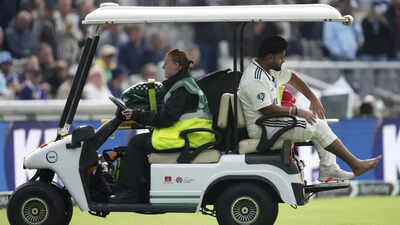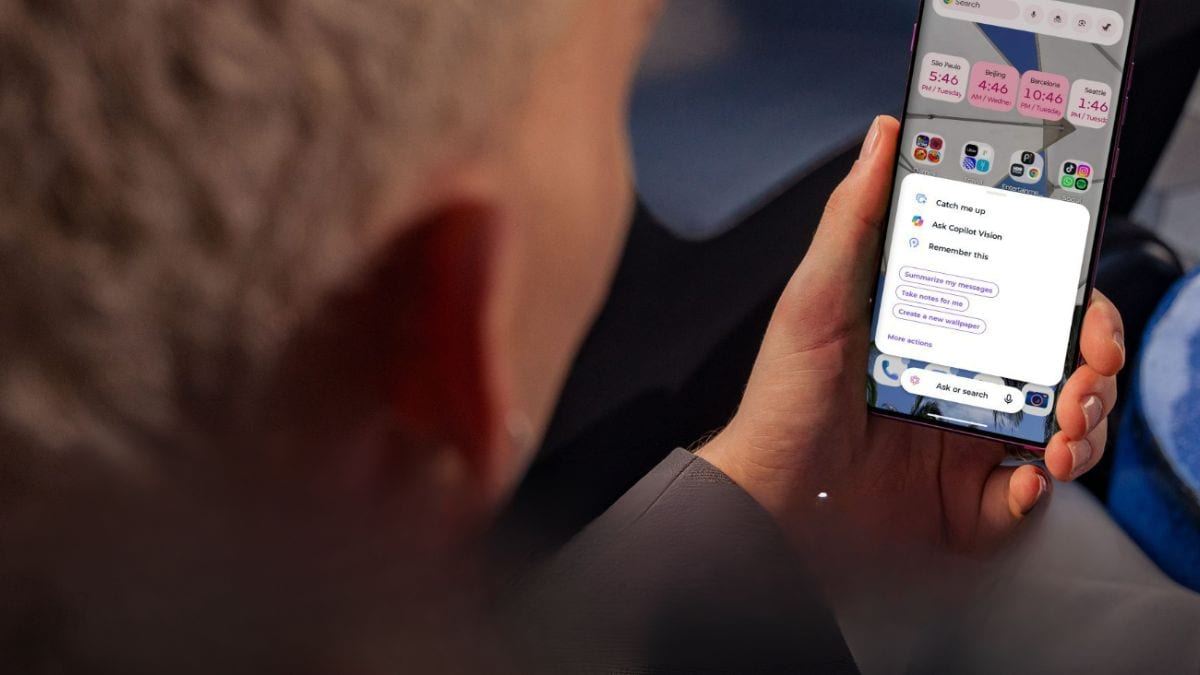ARTICLE AD BOX

Rishabh Pant was taken off on a golf cart after sustaining a foot injury in Manchester. (AP Photo)
MUMBAI: In a historic move in the light of injuries to Rishabh Pant and Chris Woakes which initially ruled them out of the fourth and fifth Tests in the Anderson-Tendulkar Trophy recently, the Board of Control for Cricket in India (BCCI) has introduced a 'Serious Injury Replacement' clause in its playing conditions for the multi-day matches in the 2025-26 domestic season, which will allow teams to replace a player who can take no further part in the match due to an injury with another like-for-like player, just like in the case of the concussion substitute rule, which was introduced a few years back in international cricket.Go Beyond The Boundary with our YouTube channel. SUBSCRIBE NOW!“This rule is being implemented by the BCCI at the ICC's behest for one season in India's multi-day domestic cricket-basically first-class matches. The rule to replace a like-for-like is only for external injury, and was explained to the domestic umpires during an ongoing seminar for them recently in Ahmedabad," a source told TOI. The new injury replacement rule applies in the Duleep Trophy, Irani Cup and the Ranji Trophy, Cooch Behar Trophy (for Under-19) and Col CK Nayudu Trophy (for Under-23).
Poll
Do you think the introduction of the 'Serious Injury Replacement' clause is a positive change for domestic cricket?
Yes, it enhances player safetyNo, it complicates the gameUnsure, need more information
However, no such injury replacement will be allowed by the BCCI in domestic white-ball cricket tournaments - Syed Mushtaq Ali or Vijay Hazare tournament.Presently, the International Cricket Council's playing conditions allow teams to make replacements if a player is concussed or contracts Covid-19, but there is no scope to replace an injured player, something which other sports normally allow. While there is no serious injury replacement rule in international cricket as of now, the new clause being introduced by the BCCI in India's domestic cricket for the upcoming season is part of the International Cricket Council’s pilot run in this regard.
In fact, the BCCI is the first full member to introduce this rule.
How and why Rishabh Pant's England tour could come to an abrupt end due to toe fracture
“A player who suffers a serious injury on the field of play at any time after the match has started (including any pre-match warm-up period) may be replaced for the remainder of the match by a fully participating like-for-like player,” the ICC had said in a statement last on June 25.The newly-introduced rule is mentioned in the playing conditions (TOI has a copy) for domestic multi-day format matches for the 2025-26 season which were sent by the BCCI to the state associations recently, and will be effective immediately from the upcoming Duleep Trophy, which will kick off from Aug 28.Under clause 1.2.8, which has a subhead with 'Serious Injury Replacement,' it has been mentioned that "If a player sustains a serious injury during the course of the relevant match, a Serious Injury Replacement may be permitted in the following circumstances." the newly-introduced rule in the Playing Conditions states.“The serious injury must have been sustained during play and within the playing area described in clause 1.2.5.2 above.
The injury must have occurred due to an external blow and result in fracture / deep cut / dislocation etc. The injury should render the player unavailable for the remainder of the match.”“1.2.8.1.2 (The) On Field umpires shall be the final authority to decide on the extent of serious injury and allowability of Serious Injury Replacement. They may consult the BCCI Match Referee and / or doctor available on ground.”In the first innings of the Old Trafford Test, Pant fractured his foot while trying to reverse sweep a Chris Woakes yorker, while Woakes dislocated his shoulder.
Both, though, gallantly shrugged off their injuries and walked into bat for the sake of their, despite experiencing extreme pain. While many fans appreciated their bravery, there were calls for a replacement rule to be introduced, lest players aggravate their injuries.After Pant had to retire hurt in the first inning of the Old Trafford Test, India's head coach Gautam Gambhir had called for the introduction of injury replacements in Test cricket, a stance which England captain Ben Stokes said he considered "absolutely ridiculous"."Absolutely, I'm all for it. If the umpires and the match referee sees and feels that is a major injury, I think it's very important. It's very important to have this rule where you can get a substitute - that is, if it's very visible. There's nothing wrong in doing that, especially in a series like this where it's been such a closely fought series in the previous three Test matches. Imagine if we would've had to play with ten men against 11.
How unfortunate would this be for us," Gambhir had said.Post Pant's injury, India were able to use Dhruv Jurel, a substitute, as their wicketkeeper in Pant's place, but he was not eligible to bat in their second innings.However, Stokes had said that the conversation should be "shut down and stopped" because any proposal "would have too many loopholes" for the teams to exploit. "I think it's absolutely ridiculous that there's a conversation around an injury replacement.
I think that there would just be too many loopholes for teams to be able to go through. You pick your XI for a game; injuries are part of the game. I completely understand the concussion replacement - player welfare, [and] player safety.
But I think the conversation should just honestly stop around injury replacements because if you stick me in an MRI scanner, I could get someone else in straightaway. If you stick anyone else with an MRI scanner, a bowler is going to show, 'oh yeah, you've got a bit of inflammation around your knee; oh sweet, we can get another fresh bowler in'.
I just think that conversation should be shut down and stopped," Stokes had said.The BCCI has elaborately laid out the procedure for an injury replacement (given below) and said the match referee will be the final authority who will decide after consulting a doctor and on-field replacement on the extent and seriousness of the injury.'The breakup of the Serious Injury Replacement rule'1.2.8.1 If a player sustains a serious injury during the course of the relevant match, a Serious Injury Replacement may be permitted in the following circumstances:1.2.8.1.1 the serious injury must have been sustained during play and within the playing area described in clause1.2.5.2 above.
The injury must have occurred due to an external blow and result in fracture / deep cut / dislocation etc. The injury should render player unavailable for remainder of the match.1.2.8.1.2 Onfield umpires shall be final authority do decide on extend of serious injury and allowability of Serious Injury Replacement. They may consult BCCI Match Referee and / or doctor available on ground.1.2.8.1.3 the Team Manager shall submit a Serious Injury Replacement Request to the BCCI Match Referee on a standard form, which shall:1.2.8.1.3.1 identify the player who has sustained the serious injury.1.2.8.1.3.2 specify the incident in which the serious injury was sustained, including the time at which it occurred.1.2.8.1.3.3 confirm that, the player has sustained a serious injury and will not be able to participate further in the match due to the injury; and1.2.8.1.3.4 identify the requested Serious Injury Replacement, who shall be like-for-like replacement for the player who has sustained the serious injury.1.2.8.1.3.5 In all circumstances serious injury replacement player shall be from nominated substitutes at the time of toss (For Col C K Nayudu Trophy from the time of nomination of players). Only in the case where wicket-keeper is seriously injured and needs a replacement then Match Referee may allow a wicket-keeper from player outside the nominated substitutes if there is no wicket-keeper in the nominated substitutes.1.2.8.2 The Serious Injury Replacement Request must be submitted to the BCCI Match Referee as soon as possible after the incident specified in clause 1.2.8.1.3.2 if a Serious Injury Replacement is to be permitted.1.2.8.3 The BCCI Match Referee should ordinarily approve a Serious Injury Replacement Request if the replacement is a like-for-like player whose inclusion will not excessively advantage his team for the remainder of the match.1.2.8.4 In assessing whether the nominated Serious Injury Replacement should be considered a like-for-like player, the BCCI Match Referee should consider the likely role that the seriously injured player would have played during the remainder of the match, and the normal role that would be performed by the nominated Serious Injury Replacement.1.2.8.5 If the BCCI Match Referee believes that the inclusion of the nominated Serious Injury Replacement, when performing their normal role, would excessively advantage their team, the BCCI Match Referee may impose such conditions upon the identity and involvement of the Serious Injury Replacement as he/she sees fit, in line with the overriding objective of facilitating a like-for-like replacement for the seriously injured player.For clarity, a Serious Injury replacement will inherit all warnings, penalty time and suspensions that were imposed on the replaced player.1.2.8.6 The BCCI Match Referee may, in reviewing a Serious Injury Replacement Request made in accordance with clause 1.2.8.1.3 request any such further information as may be required in order to make the determination required under clauses 1.2.8.4 and 1.2.8.5.1.2.8.7 The decision of the BCCI Match Referee in relation to any Serious Injury Replacement Request shall be final and neither team shall have any right of appeal.1.2.8.8 Once the Serious Injury Replacement has been approved by the BCCI Match Referee, the replaced player shall take no further part in the match.1.2.8.9 Both the Serious Injury Replacement and the replaced player shall be considered to have played in the match for records and statistical purposes.Deliberate short runA deliberate short run is an attempt for batters to appear to run more than one run, while at least one batter deliberately does not make good their ground at one end.
Batters may choose to abort a run, provided the umpire believes that there was no intention by the batter concerned to deceive the umpires or to score the run in which they didn't make their ground.- request the captain of the fielding side to identify which of the two batters will take strike for the next delivery.Retiring batsman25.4.3 If a batsman retires for any reason other than as in clause 25.4.2, he will be considered as dismissed immediately and will not have the option of returning to bat even with the consent of the opposite captain. His innings will be recorded as 'Retired - out'.



.png)
.png)
.png)
















 6 hours ago
3
6 hours ago
3









 English (US) ·
English (US) ·